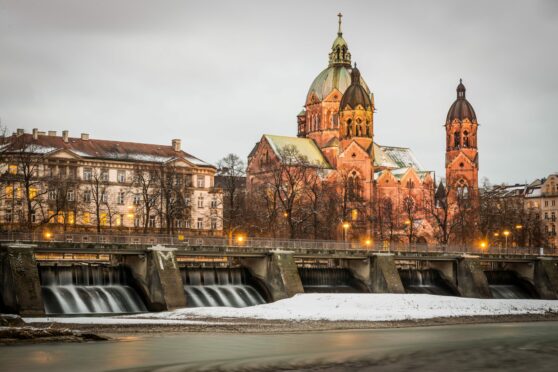
Surrounded by darkness, I take a deep breath of the freezing air. The warming scent of oranges and sweet cinnamon guides me to a wooden hut, where a man spreads thick chocolate sauce on sizzling crepes and ladles out mugs of steaming mulled wine.
I’m exploring one of Munich’s many famous Christmas markets.
When most people think of Munich, the heartland of the Bavarian state of Germany, their minds automatically go to the markets, or perhaps the famous beer festival Oktoberfest or the lauded Bayern football team.
However, Munich’s trendy, progressive history is often overlooked. Affordable hotel chain ibis Styles has set out to flip the narrative. With its spectacular retro-themed design, the group’s new hotel, ibis Styles Munich Perlach, revives the city’s underground disco culture.
The reception doubles up as a bar, backed by royal blue walls edged with white tiles.
Chrome accents and glowing orb lights brighten the space.Structural tube sofas in plush jewel colours are scattered with cushions featuring famous album covers from the ’70s and ’80s. Vinyl record motifs, sequinned fabrics and wavy design features add to the retro décor.
A sleek DJ booth, large glittering mirror balls and pop music from previous decades playing in the background transports you straight to Munich’s disco past.
The rooms are simple but comfortable and neat, with all the necessities you would need for a small city break, including a large en-suite bathroom as standard. Bling is the thing though, with neon tube lights and novelty electro-style headboards in keeping with the hotel’s party theme.
Opened in time for Oktoberfest 2022, the hotel is in the quiet Perlach district, south-east of Munich’s centre. The U-Bahn station, Neuperlach Zentrum, is on the other side of the road, where it is only a short train ride into the city centre, with good links to the airport. A 30-minute train ride takes me to the district of Schwabing, in the north of the city, once the bohemian epicentre of Germany at the turn of the 1900s.
During the 1960s student riots, Schwabing became a hotbed of rebellion and resistance. Schwabinger Krawalle (riots) occurred in response to the police expelling a group of street musicians from the area.
While gentrification has taken a toll on the area, some small, independent and alternative event spaces still exist today.
One is the Theatre Am Sozialamt, or TamS. It was converted from an old bath house in 1970 and still features performances that centre around the political, the literary and the strange. While most of Munich’s club scene died with the pandemic, the Münchner Stadtmuseum’s exhibition, Here Comes The Nightclub Culture In Munich, takes visitors on a deep dive into the city’s night-time underworld.
The exhibition, which will run until January 2024, also features extensive video footage and images of Munich’s most notorious nightclubs. One of these, the Atomic Cafe, has even been restored as a walk-through installation for the public to explore.
Relics of Munich’s retro past are tough to spot now, but there are still a few hidden gems that are a delight to uncover, such as Schmalznudel Cafe Frischhut on Prälat-Zistl-Straße. Popular in the ’70s, the Alpine-style café originally opened at 5am, making it the perfect post-clubbing breakfast stop.
It offers five types of schmalznudel, a crispy Bavarian pastry made from fried dough, perfect for soaking up one too many glühweins from the market. Enjoy one with a mug of creamy hot chocolate, while taking refuge from the cold.
P.S.
Freddie Mercury chose Musicland Studios to record his solo album Mr Bad Guy. He lived in the city from 1979 to 1985, in an apartment at Stollberg Plaza. A great way to explore hotspots from the ’70s and ’80s is on a Freddie Mercury tour of the city (muctours.de; €39/£33.50 per person).
Factfile:
ibis Styles Munich Perlach (all.accor.com) prices from €79/£68 per night for a single room. Doubles from €89/£76 and family rooms from €130/£111. Breakfast is extra.

Enjoy the convenience of having The Sunday Post delivered as a digital ePaper straight to your smartphone, tablet or computer.
Subscribe for only £5.49 a month and enjoy all the benefits of the printed paper as a digital replica.
Subscribe © Press Association Images
© Press Association Images